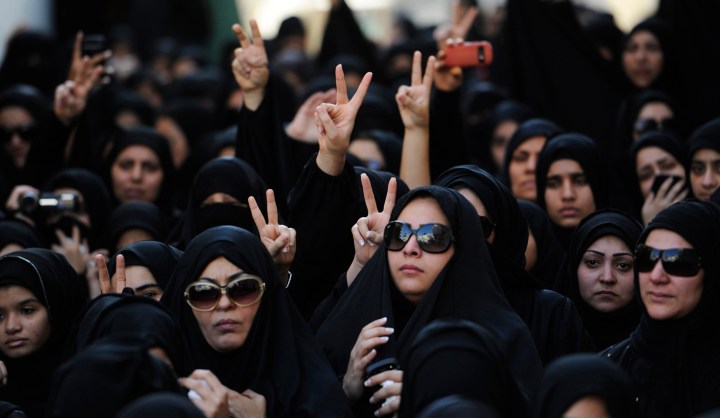World
Bahrain, beneath the talk of reconciliation

The Bahraini government, to the untrained eye at least, has the look of a regime committed to political reform and reconciliation. But in the last two weeks, two separate incidents at two different airports have pointed to a less resolved state of affairs in the island kingdom. By KHADIJA PATEL.
In recent weeks, several reports from Bahrain have warned of a deteriorating security situation. The government, we’ve been told, is intensifying its crackdown on the pro-democracy opposition. It is trying to silence those covering its actions. And yet Bahrain does not feature prominently in global media. Syria is a much more compelling story these days, and the Bahraini government, to the untrained eye at least, looks for all the world like a regime committed to reform and reconciliation. Two apparently small incidents in the last two weeks tell a different story, however.
Maythal Al-Hassan is doctoral student in the department of American studies and ethnicity at the University of Southern California. She is an American citizen and, as a freelance journalist, she has worked for Al-Jazeera. But during a visit to the United Arab Emirates last month, she was travelling in her personal capacity, touring the region while visiting family in Abu Dhabi. “I was in the UAE and I wanted to tour the region,” she told Daily Maverick over Skype. “I had a limited time but I wanted to visit both Qatar and Bahrain.
“I have friends in Qatar but I don’t know anybody in Bahrain. I was warned by friends who are journalists that because I’ve done work for Al-Jazeera I wouldn’t be allowed in.”
Despite niggling worries that she would not be allowed into Manama, Al-Hassan travelled to Bahrain on 21 August. “I had done my research; I knew Americans could get visas on arrival,” she said. After enquiring about the visa at an information counter, she proceeded to immigration where she was asked what she described as “standard” airport immigration questions. As the questions continued, she began to worry again that she would not be allowed into the country. “I was becoming paranoid,” she said.
Al-Hassan was then made to wait an hour and a half after her flight, until she was the only remaining person at immigration. Her plan to purchase a visa at the airport, as procedure allowed, had been thwarted.
“Something very suspicious was happening,” she said.
As she waited, officials at the information counter warned her about the situation in the country. “They told me, ‘It’s not safe’,” she said.
After some time, she was told that she had been denied a visa and would not be permitted to enter Bahrain. After pointing out that she had an American passport and ought to qualify for a visa on arrival, she was told to apply for a visa at the Bahraini mission in the US before attempting to enter the country again.
“The supervisor said to me: ‘Americans can get visas on arrival, but you, you need to contact the embassy’,” she said.
She was then escorted to a Gulf Air flight headed to Doha, but she had still not learned why she had been prevented from entering the country.
“Over and over again, I asked why I wasn’t being allowed in and I was told, ‘No reason’.
“If they didn’t give me a reason then they have nothing to defend,” she said.
The only reason Bahraini officials offered for refusing her entry into the country: “I was told, ‘You know why’,” she said.
Al-Hassan’s account of Bahraini authorities’ refusal to allow her entry into Manama overlaps in some ways with Bahraini activist Maryam Al-Khawaja’s account of Egyptian authorities’ refusal to allow her entrance into Egypt on the night of Sunday 26 August – although, unlike Al-Hassan, she was of course not trying to enter Bahrain. Al-Khawaja was en route to Johannesburg when she stopped in Cairo. When she last tried to enter Cairo, she met with stern resistance from Egyptian officials who delayed her in the immigration hall for some hours before eventually allowing her into the country.
“This time was a bit weird,” Al-Khawaja said during an interview with Daily Maverick in Pretoria last week.
“I arrived in Cairo with seven hours ahead of my next flight. I had agreed with some of my friends that I would go inside (Cairo), meet with them, get some food and then leave again. As I got there, I went to passport control, paid for my visa; he stuck the visa inside my passport and approved it. He asked me where I was originally from. Usually they ask you where you’re originally from because that’s how they know if you’re blacklisted or not. He was like, ‘Oh, you’re born in Syria’. And I (said), ‘Yes’.
“He then tried to speak to me in Arabic and (I said), ‘I speak English better.’ He didn’t even recognise that I was Bahraini. He gave my passport back to me and as I was leaving, I heard someone shouting, ‘Maryam! Maryam!’ I turned around and there was a police officer running after me and (he said), ‘You’re Bahraini and you’ll have to wait just like you did the last time’.
Al-Khawaja was made to wait in the same spot she waited in the last time she had encountered Egyptian officials at Cairo airport. She would soon learn that she was not to be allowed into the country.
“A while later they called me into the police office and he told me, ‘It’s not going to work, you’re not going to be allowed into Egypt.’ And I asked him why, and he said, ‘Well, the reason is top secret so we can’t tell you.’
“I said, ‘I’m forbidden from getting into Cairo. It’s all about me. For some reason I’m blacklisted and I’m not allowed to know why.’ He said, ‘Even if I wanted to tell you I couldn’t, because I don’t have that information from the intelligence and you’re on a list because you are a threat to national security.’
“I laughed I said, ‘Do l look like I’m a threat to national security?’
“He said, ‘Not to me. But I’m not the one who makes the list.’ So I insisted. I said, ‘I’m not going to leave until you tell me what the reason is.’”
It was the same ploy that Al-Khawaja had used with Egyptian authorities the last time. This time, however, the Egyptians were unyielding. Her Egyptian lawyer tried to intervene, but was met with the same obstinate responses. She would not be allowed into Egypt no matter how long she waited and they would not reveal why.
She said, “My lawyer told them, ‘You can’t stamp approval into her passport and then tell her she’s not allowed in. If you stamped it, it means there’s no problem.’ So [one of] the people he was speaking to, one of the officers, got very angry and he said, ‘Well, if you continue to insist on finding out what the reason is and you continue to insist that she’s not going to leave, we are going to forcibly deport her to Bahrain where she has an arrest warrant’.”
Al-Khawaja claims it was the first she has heard of an outstanding arrest warrant for her in Bahrain.
“I didn’t know this until the Egyptian intelligence told my lawyer,” she said.
“So I was actually surprised. I know that I have problems with the Bahraini government. I know that because of my activism but I didn’t know that there’s actually an arrest warrant out for me. So this is how he threatened me because he thought that this was going to have an effect on me. I told my lawyer, ‘I’m not scared. If they want to deport me it’s fine. But I also want to know why I’m being deported.’”
Al-Khawaja’s efforts were proving futile and the Egyptian authorities were losing patience.
“After a while, it seemed the situation wasn’t getting any better,” she said.
“They were threatening and I didn’t want my lawyer to get into any problems. And my lawyer told me that it’s too late anyway because there was only two hours left for my flight.
“They continued to refuse to tell me why and I left.”
Al-Khawaja has, however, vowed to continue trying to enter Egypt.
“This is the second time it’s happened to me but the last time I was actually allowed in after a while. So I’m going to keep trying,” she said.
Just as Al-Hassan was told by Bahraini authorities to apply for a visa at the embassy when she next tried to visit the country, so, too, Al-Khawaja was advised by Egyptian airport officials to apply for a visa at the Egyptian embassy in Denmark – she holds Danish citizenship – before travelling to Egypt again.
“One of the things that the police officer told me, he said, ‘Next time you want to come to Egypt, try getting the visa from Denmark before you come.’ He said, ‘If you get the visa from Denmark,’ – and I was of course travelling on my Danish passport – ‘He said, if you get the visa from Denmark, that means you’re fine. They won’t stop you. But if you buy the visa from the airport it could become a problem.’”
While Al-Hassan mulls her next step, Al-Khawaja has written an open letter to Egyptian president Mohammed Morsi voicing her dissatisfaction with the treatment she’s received at Cairo International Airport.
“After that, in my capacity as the acting president of the Bahrain Centre for Human Rights, I wrote an open letter to the president of Egypt, telling him what happened and saying, you know, he was someone who was subjected to these types of measures before the revolution,” she said. “You would think that him coming in to power now would mean that human rights defenders would not be treated this way in Egypt any more. It’s very, very disappointing that they are.”
Despite Al-Khawaja’s entreaties to the new political order in Egypt, it is the Egyptian state’s old ties with Bahrain and its intelligence sharing agreements that have caused Al-Khawaja’s airport troubles. In her case at least, as much changes as remains the same. Al-Hassan, however, was told by Bahraini authorities that just as American officials are entitled to refuse entry to non-Americans visiting the US, so too Bahraini officials are entitled to do the same. But the new order’s co-operation with old allies, like the Bahrain government, also adds greater credence to Morsi’s promise to his gulf neighbours not to “export” Egypt’s revolution.
In the meantime, the Bahraini government’s refusal of entry to an American journalist, and issuing warrants of arrests for activists, tells the greater tale of continuing unrest in Bahrain that has largely escaped the attention of the world’s media. But reports from activists and journalists claim Bahrain is intensifying its crackdown on the pro-democracy opposition, and the government is also doing its best to silence any voices that may tell that story. DM
Read more:
- ‘Bahrain activist crackdown on rise’ on RT
Photo: Women show the victory sign during the funeral procession for Hussam al-Haddad, who died from birdshot wounds, in Muharraq, north of Manama, August 18, 2012. A 16-year-old protester was killed after what opposition activists in Bahrain said was a “brutal attack” by security forces, but which the Bahrain government described as a defensive response to a petrol bomb attack on police. The government identified the dead youth as 16-year-old Hussam al-Haddad, and said he had been among protesters throwing petrol bombs at police and had died after being taken to hospital. The opposition Bahrain Centre for Human Rights said witnesses had seen the security forces fire birdshot, a type of shotgun shell, at Haddad before men in plainclothes kicked him repeatedly as he lay on the ground while police stood by. REUTERS/Stringer



















 Become an Insider
Become an Insider